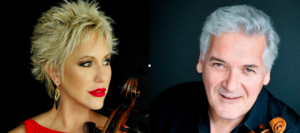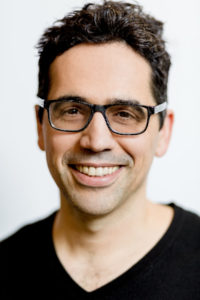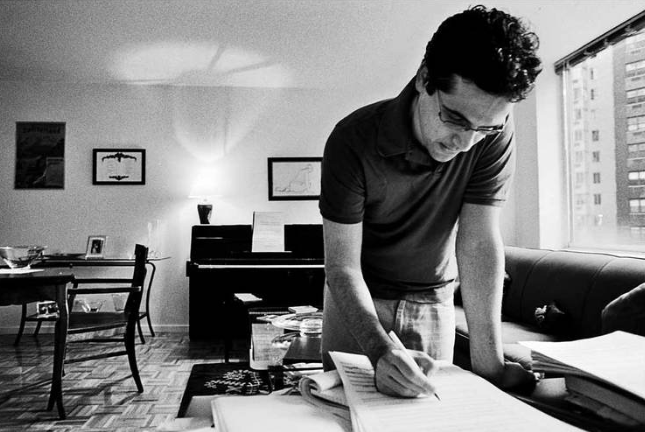Avner Dorman was at work at Gettysburg College a few years ago when he was contacted about a commission.
“They wanted me to write a concerto for Pinchas Zukerman and Amanda Forsyth his 70th birthday.” The winner of the 2018 Azrieli Prize for Jewish music said, “sure.”
That understated relpy belies what Dorman calls “a special experience. Sometimes you write a concerto for someone and they learn it and give you feedback and that’s about it.” That wasn’t the case with this piece.
“I would send them drafts and they would give me their thoughts and play some stuff for me. We ‘facetimed’ a lot during the writing process.
“Pinchas was especially involved, committed and collaborative in a way that I would never have expected from someone as busy as he is.
“You would expect him not to be as involved but it was quite the opposite.”

Amanda Forsyth and Pinchas Zukerman. Photos: Cheryl Mazak
For the composer, the collaboration was a learning experience.
“They play concertos on the biggest stages all the time. Their frame of reference is very unique. The piece they wanted was something that would live in their world.”
You’d think that would have made Dorman nervous but “in a way, it was the opposite. For me, it’s more nerve-wracking to work on your own and then have some comments from a publisher. And then you suddenly arrive and 100 are playing the music with no chance for any feedback from them.
“Writing music is very much an internal experience and I appreciate having an exchange with a performer.”
Of course, some commissions are by design kept hidden.
“I’m doing a sonata for a piano competition so obviously the competitors aren’t going to see this beforehand.”
The concerto is a commission by the Adelaide Symphony Orchestra, the Boston Symphony and the NAC orchestra. It’s been played in Australia and at Tanglewood. The Double Concerto will be performed for the first time in Ottawa at the National Arts Centre on Nov. 27.
He finished the work about a year ago.
He wrote the first movement and sent it to them. “We worked on it together and that really informed the other two movements.”
In that effort, the identity of the piece came together.
“I need time to get to know my motives and my harmonic progressions and to get to know the piece. Once I feel familiar with it, it almost writes itself. The notes seem to know where to go. Over time it becomes more and more inevitable.”

Avner Dorman.
Dorman said he felt that the interaction between the two musicians became a central element of the piece.
“Getting to know their dynamic as a couple was a very interesting thing.
“You have two protagonists and they fight for their place. They are also a protagonist together. In a double concerto there is a built-in drama. Pinchas has one point of view and Amanda is saying the opposite. This is good material for a story.”
Those personality differences are evident in the piece, he said.
Zukerman is “very passionate and ultra-expressive. He can be exuberant and and a leader with a take-charge nature,” Dorman said. “There is also an element of memory in his character. I used the word nostalgic in the program notes and I’m not sure that’s the best word.
“I really thought I was capturing this element of him but now I think it’s more me remembering hearing him play when when I was a kid in a suburb of Tel Aviv.
“For me, he is an important figure in Israeli music history. I heard him I can’t even count the times when I was a kid. He was this famous person on stage.”
The piece begins with Pinchas playing this very simple tune on his own. “I think my memory is there.”
Being Israeli and so fascinated in hearing what Zukerman has to say, Dorman feels that “we have bonded in a way that I wouldn’t have guessed would have happened. He’s like a close uncle now.”
He didn’t know Zukerman before working on this piece. He was the only prominent Israeli musician he hadn’t met before.
Dorman feels part of the tradition of Israeli music. It is very much part of culture and society, he said.
“Mentoring is definitely part of the culture. It is part of being a musician from anywhere. We trace lineages back because those things matter. The more you learn, the more you understand that what you call ‘my’ music is the result of generations of training, information and exploration.
“My daughter Allegra is studying the violin with a teacher from Ukraine who comes from same lineage as Jascha Heifetz and he talks about it all the time. My teacher in Israel would talk about his teachers. When you are successful, you give it to the next generation.”
Dorman says that Amanda Forsyth has an exploratory character. She is “adventurous and she will be off the beat for 20 measures at a time completely going for it with crazy tone rows.” In the concerto, he said, “she is the driving force into the modern world.”
Dorman has a nine year old daughter named Allegra who, he believes, has a similar personality.
“My daughter came with me to Tanglewood and when she met Amanda they bonded and hung out for hours.”
Forsyth’s father Malcolm, was a composer and trombonist.
“In the second movement of the concerto, I gave her a duet with the trombone. There is a lot of slide and jazz-infused moment and she revelled in it. I didn’t tell her about it and in the first rehearsal she teared up. Having a daughter, I feel a connection there.”
The individual voices do come together in the second movement in an expressive moment when they play the main theme together.
“I feel that’s where they meet and unite as a couple.”
It is rare for a double concerto to be written for a couple. And this concerto is unique opportunity to examine two musical lives and their relationship.
There is a story behind the Brahms Double which is also related to relationships, Dorman said. Brahms wrote it for his estranged friend, the violinist Joseph Joachim. The concerto was an attempt to reconcile with Joachim, after their friendship had ruptured following Joachim’s divorce from his wife Amalie. Brahms had sided with Amalie in the dispute.
The last movement is a quite exploratory, he said.
“I feel it’s very unified for a last movement which is a tricky thing to do.”
Dorman has been living in the U.S. for the past 15 years. He came to study at The Juilliard School and stayed for professional reasons.
“I miss home a lot,” he said, “but it was professionally important to be in a central location.” Now that he is married with two children and a position at Gettysburg College in Pennsylvania, there’s no going back to stay, at least for the time being.
The college itself is right by the Civil War battlefield. The battle has prompeted a piece of music based on letters written during the battle.
The Cady Letters were set to music and the recording was released this past summer. piece of music.
It was an appealing subject. I have written quite a few pieces now that deal with the questions of war and with the personal outcomes of war.
“This was an opportunity that came up. It was the 150th anniversary of the battle and the college commissioned a piece. I met with the head of the Civil War Institute and he said I should read the letters. Once I did, I had to do something with them.
Dorman grew up in a country that is “always” at war (or under the threat of war). He has had friends die in war.
“We have to deal with it all the time. Music is a powerful vehicle for dealing with these issues.”
He did his mandatory service mostly spent writing and arranging music for the Israeli Army orchestra and a variety of military music groups.
But his brother fought and friends.
“I grew up in a liberal town and went to an arts high school. I graduated wanting to write music and play piano and then you go into the army. It was very jarring for me.”
NAC Orchestra presents Avner Dorman’s Double Concerto
Featuring Pinchas Zukerman and Amanda Forsyth
Where: Southam Hall
When: Nov. 27 at 7 p.m.
Tickets and information: nac-cna.ca







